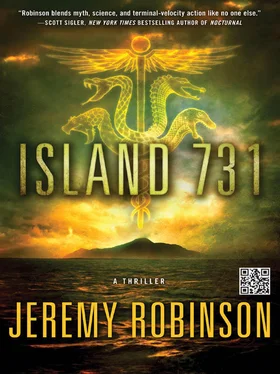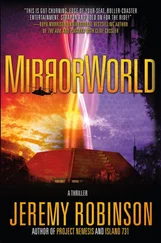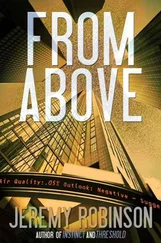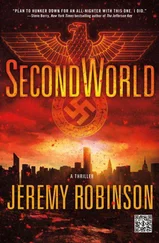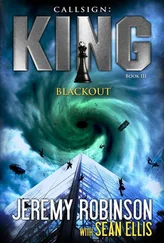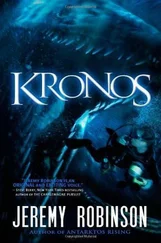Hawkins held up a slip of paper upon which he’d written a list of supplies. Nothing extravagant: food, water, bedrolls, first-aid kit, and a radio to communicate with the ship.
Drake read through the list, but paused halfway through. “Bedrolls?”
Bray repeated the question. “Wait, bedrolls? You want to sleep out there?”
“Once we’re out there, we’re not coming back until we find him.”
Drake crossed his arms. “Sorry, Hawkins, but I want you back on board by the time the sun hugs the horizon.”
“We’ll lose time and ground,” Hawkins said, losing his patience. “We can only walk so far before turning around. It limits how far we can search.”
“It’s summer,” the captain said. “The days are long. And as you pointed out, this is an island. If he keeps moving, he’ll make it back eventually.”
“And if he doesn’t?” Joliet asked.
“Then you better hope Jones figures out how to get my ship back. I don’t need to remind you that we have no propulsion, and no way to contact the outside world. Our food and water will only last so long. You may end up becoming intimately familiar with every nook and cranny of this island.” Drake looked at the list again. “Look, how about this? If you have a solid trail, spend the night. If you’re just running search grids, I want you back.” He offered his hand to Hawkins.
Hawkins took the captain’s hand and shook it. “Agreed.”
Drake handed back the list. “Blok is clearing the aft decks. He’ll get you everything you need.”
“Thank you, Captain,” Hawkins said.
Drake grunted.
Joliet rushed toward the outside door. Hawkins followed. Then Bray.
As they exited the wheelhouse onto the exterior staircase, Bray looked at the jungle and asked, “Are you really planning to stay out there overnight.”
Hawkins descended the stairs. “Yup.”
“And if there isn’t a trail? Will we really come back?”
“There’ll be a trail,” Hawkins said.
“But what if—”
Hawkins stopped and turned around. Bray wasn’t understanding. “There will be a trail.” He left out the words “even if we don’t find it,” but Bray seemed to understand.
“Shit.”
The front end of the ten-foot-long inflatable Zodiac boat rose high out of the water as Bray twisted the throttle. Hawkins dove forward, putting his weight on the bow of the Zodiac, but wind and acceleration were working against him.
“Slow down!” Hawkins shouted, but Bray either couldn’t hear him over the whine of the engine or was ignoring him. Hawkins lifted up his head and peeked over the front end. The distance between the Zodiac and the white sand beach shrank quickly. “You’re going to ground us!”
Joliet didn’t weigh much, but when she added her weight to Hawkins’s, the front end lowered and revealed the beach, now just twenty feet way. As they entered the shallows, Bray opened up the throttle all the way, for just a moment, and then shut the engine off and tilted it forward, lifting the propeller out of the water.
Momentum carried them through the two-foot-deep shallows. Fish scattered as they passed by. Hawkins imagined how easy fishing would be here and thought they would have no trouble staying alive if they were, in fact, stranded. A loud sifting sound coupled with a jolt announced their arrival at the beach. The boat slid halfway ashore before stopping and Bray wasted no time leaping onto the sand.
Hawkins took a backpack of supplies and tossed it hard to Bray, who caught it, but not well. “What the hell was that?”
“What?” Bray said.
“You nearly flipped the boat,” Hawkins pointed out.
“You want to be eaten by a shark?” Bray answered.
“Sharks don’t eat ten-foot Zodiacs,” Hawkins said.
“ If it’s a shark,” Bray said, “and it’s strong enough and big enough to make short work of that fishing net, I don’t think it would have any trouble with an inflatable Zodiac.”
“He’s right,” Joliet said, catching Hawkins off guard. “Sharks routinely attack small boats. Even if it’s just out of curiosity, one bite would sink a Zodiac.”
Hawkins wasn’t above admitting he was wrong. “Okay. I’m sorry. How about a little warning next time?”
“Done,” Bray said.
The three of them dragged the boat up onto the beach and Hawkins tied it off to the base of a palm tree. After securing the boat to ensure high tide didn’t sweep it away, he looked up at the palms shifting in the breeze above. “No coconuts.”
“Who cares?” Bray said. “You planning on having a piña colada?”
“Nevermind.”
“You think we’re stuck here,” Joliet said. “Don’t you?”
Hawkins stepped past the pair and started down the beach. “Let’s just find the footprints.”
“Well, that’s a yes if I ever didn’t hear one,” Bray said as he gave chase.
Hawkins quickly found the line of footprints and knelt to inspect them, hoping they would distract Bray from his line of questioning. While he didn’t know for sure that they were stranded, he wanted to be prepared for the possibility. He’d keep track of every food and water source they came across. There were eleven crew members to feed—not including Kam—and while their supplies would last a while, especially if rationed, eleven people wouldn’t be easy to feed. And while there were plenty of fish in the water, there were also sharks, which apparently could eat people and boats.
“He was running before he hit the beach,” Hawkins said, looking at the footprints, which were actually closer to toeprints.
“Unless he was tip-toeing,” Bray said, and when Joliet and Hawkins both gave him disapproving glances, he added, “What?”
“No blood,” Hawkins noted. “I don’t think he was injured.”
They followed the tracks, which led along the shore for thirty feet before veering to the left and disappearing into the jungle. They stopped at the line of trees and brush that fringed the beach.
“Does this not make sense to anyone else, or is it just me?” Bray asked.
“What doesn’t make sense?” Joliet asked.
“First of all, Kam goes outside during the middle of a storm—a storm that killed Cahill, an experienced sailor. We have to then assume that Kam fell overboard, or was swept overboard by a wave. Yet he somehow stayed with the Magellan .”
Joliet answered, “He could have been caught in a net, like Cahill, but higher. Above the waterline.”
“Okay,” Bray said, “so he’s caught in a net, on the outside of the ship, where he spends the night being pummeled and nearly drowned by waves. He survives until morning, and instead of calling for help, or climbing the net, he drops into the water, has the energy to swim to shore, with a killer shark at his heels. Then he runs— runs —onto the shore, along the length of the beach and finally into the jungle. No open wounds. No broken legs. And full of energy. I don’t know if you noticed, but we were in the wheelhouse and knocked down for the count. So how did a little guy like Kam pull that off? And if he was so afraid of the shark, why didn’t he run straight into the jungle?”
Hawkins replayed Bray’s words in his mind. He couldn’t find a single flaw in the man’s reasoning. “Right, right. It doesn’t make sense.”
“Unless he was panicked,” Joliet said. “He would have been delirious when he ran along the beach. Not thinking. And then he saw something that both of you have missed.” She pointed to the edge of the jungle where the footprints led.
Hawkins eyed the brush. It was subtle, but he could see what Joliet had already seen—a break in the overgrowth.
Читать дальше
